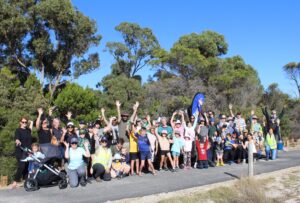With the recent run of hot weather, and a predicted hotter-than-average summer ahead, critically endangered Western Ringtail Possums are needing specialist first aid in increasing numbers. Dehydration, burns to their feet, and attacks by domestic animals as they seek relief from the heat have been reported in the South West.
Presenting at a recent course for wildlife rehabilitators, local vet Dr. Felicity Bradshaw discussed the need to keep an eye out for distressed animals. “Possums that have come into human care may have experienced acute and chronic psychological and pathological stress through pain, fear, injury or disease. If ambient temperatures are over 38 degrees for 3 or more days, possums can become dehydrated. They can be found weeks or months after the event with weight loss and renal failure,” said Dr Bradshaw.
The ’First Aid for Possums’ course was developed after members of the Western Ringtail Action Group (WRAG) identified a need in the community for better training and care of Western Ringtail Possums. 51 wildlife rehabilitators from six different rehabilitation groups across the South West joined Dr. Richard Lucas from Busselton Vet Hospital and Dr. Felicity Bradshaw for First Aid for the training that was designed specifically for wildlife rehabilitators. The course was specifically designed to address real-life scenarios, with content covering possum welfare, emergency management and triage, burns, broken bones, pain management, bloating, gut biome, bandaging, and fluid administration.
Organised by GeoCatch, project officer Nicole Lincoln was impressed with the level of interest from the animal rehabilitation community. “We had a great turnout from Geo Bay Wildlife Rescue Inc, FAWNA, Possums R Us, Dunsborough & Busselton Wildlife Care, Bridgetown Wildlife Rescue, and FAWNA Mandurah. The training ensured that all groups have access to the same current first aid procedures, information, and knowledge,” said Nicole.
Nicole expanded on what to do if you find an injured possum or other native wildlife. “Call the Wildcare Helpline 9474 9055. They will advise if the injured animal needs to be taken to a vet or wildlife carer. Injured wildlife should be kept in a safe, dark and warm place until they can be handed over to a wildlife carer. Use a towel or similar to pick it up and place it in a secure, well-ventilated box in a quiet, dark place. Do not feed the animal or give it water unless you have been advised to do so,” said Nicole.
Local Vets Dr. Bradshaw and Dr. Lucas emphasised that successful reintegration into the wild after care is the primary goal for rehabilitators. “This training will contribute to successful welfare and rehabilitation outcomes for Western Ringtail Possums by increasing knowledge amongst the rehab community,” said Dr. Bradshaw.
First Aid for Possums was funded using the proceeds from the sale of Western Ringtail Possum soft toys at Busselton and Margaret River Visitor Centres, with community members and visitors purchasing over 650 toy possums in the past 3 years. These sales are part of an ongoing regional partnership between the Margaret River Busselton Tourism Association and the Western Ringtail Action Group, with proceeds invested into possum conservation projects, as determined by WRAG. The soft toys are still available to purchase from the Busselton and Margaret River Visitor Centres, with $10 from every sale going to possum conservation projects.




















